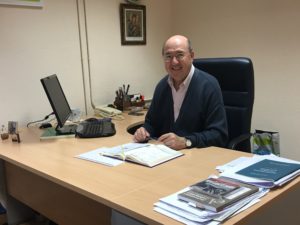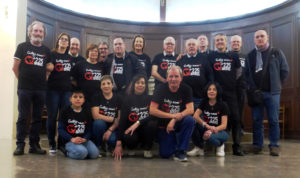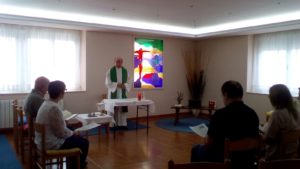I met the Clerics of St. Viator when I entered St. Joseph’s College in Vitoria in September 1960. I was six years old. When I was twelve, Carlos González de Zárate, a vocation recruiter, gave us a survey and Luis Gutiérrez, the director of the College at that time, summoned me to talk with him. 
My dream was to become a priest and I was thinking of entering the Diocesan Seminary, where three of my cousins were. Luis, very “crafty” and aware of my intentions, asked me: “And wouldn’t you like to be like us?”
The question unsettled me, but Luis hit the nail on the head: a new perspective opened up for me. It was true; the religious of the school seemed to be desirable models. They taught thoroughly and tried to make us useful people; they chatted with us in the courtyard and played soccer by rolling up their cassocks; they accompanied us to the movies, on walks, and when they punished us… I could sense a cordial, friendly relationship among them, with a sense of humor, and they formed a particular team.
They prayed the rosary with us in class, shared the Thursday morning Eucharist or the exposition of the Blessed Sacrament on Sundays before the film session in the small school chapel, which was also their community chapel. I saw them as devout and they showed a close relationship with Jesus and Mary. And, above all, I saw that they were happy. Yes, I wanted to be like them.
After two years of Juniorate and Postulancy, the novitiate followed. Our Master of Novices, Avelino Murua, immersed us in the “Milestones for a Theology of Religious Life,” as the “brick” with which he wanted to make known to us what religious life was after Vatican II. But it was our dear Jaime Gómez Gutiérrez, master of postulants, companion in the scholasticate and an accurate guide, who gave me a synthesis of religious life as love signified by the three vows: chastity, as a love of universality, focused, above all, on those who most need to be loved; poverty as a love of solidarity, which makes me share what I am and what I have; obedience, as a love of openness to what God wants from me, through his mediation. And this love lived in community, a sign of God’s love in and among us.

Visiting Vourles. Fr. Pedro is at left in the back row.
After a few years, the first associates arrived. It was a joy to share the charism and the Viatorian life with lay Christians. At first, no, but later I felt the need to «reposition “my” Viatorian religious life.” How can we maintain the “being” of religious life when we share with the laity the “doing”, even more, part of our “being”? Isn’t this community of life and mission with the laity going to be a danger for religious life?
It helped me quite a bit to consider that religious life has never been for itself and that the Associates have brought me the richness of their lay life to deepen what I consider valuable in viatorian religious life:
- the unwavering faith in this ever provident God, as lived in an exemplary manner by Querbes, which my religious life wants to translate as putting nothing before the love of Christ, that love which is reflected in those who need me most
- the Viatorian charism as a catechist, a herald of Jesus Christ and his Gospel, that I try to live in religious life as that imperfect sign of the great love that God has for us and as that prophetic witness of the primacy of God and of the values of the Gospel, and as the promoter of communities in which faith in the Risen Jesus is lived, deepened, and celebrated, that I try to live in my religious life as a factor of communion in relation to my religious community and my Viatorian community
- through the vows, which seek to continue to be in my life a way of radically following Jesus Christ, no less radical than other forms of Christian life, but far removed from the lifestyle that moves our world such as social and economic status, the search for security in things, the affective “open bar”, indifference to the abandoned and all that is opposed to being identified as a “bachelor”
- in obedience, which wants to be passionate about doing God’s will, to mean that God is the only Absolute of my life so that His will is fulfilled in me
- in chastity, which wants to focus my love on Jesus Christ, my only Lord, and on my brothers and sisters, particularly those who need me most, who are the subjects of my preferential love
- In poverty, which leads me to try to trust only in God and in his mercy and, therefore, to be alert to the excessive care I can take of my limitations and needs, and to fight against injustice, the idolatry of money or power.
- lived in the religious community as my nuclear family and in the Viatorian community, the great family, knowing that religious and lay people complement each other and that I have a great responsibility in the Viatorian community because we religious – and more so the Viatorians- must be experts in communion, as I said above about the Viatorian charism.

Celebrating Mass during a retreat
Viatorian religious life will be significant in the measure that it can generate a community of sons and brothers, a community of equals, both in the religious community itself and in the Viatorian community; a community that lives fraternity and wishes to have one heart and share in solidarity our limitations and our projects, our qualities and capacities, our tasks and our retributions, yes, also our dollars and euros; a community in which we seek to live communion not only among ourselves, the religious or the Viatorians, but also with the people with whom we share the mission, with our recipients and with those who are situated in our ecclesial and social environments.
I thank the Lord for the gift of the Viatorian religious life and, looking back on my life, I consider that Viatorian religious life will be meaningful as long as our lives express the primacy of God; as long as our counter-cultural lifestyle is a consequence of following the Risen One; as long as we are faithful to the Viatorian mission; as long as we live in community being factors of communion in the Viatorian community and in those communities where we exercise our mission.
I believe that those religious whom I met at St. Joseph’s College made Viatorian religious life meaningful in those ‘’sixties”, and it is in our hands and in God’s hands to make Viatorian religious life continue to be valuable for our Church and for our society.
Pedro María Lahora, CSV



